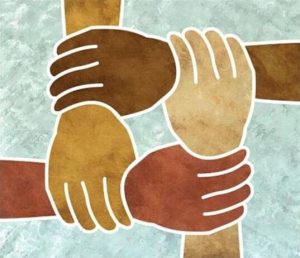 We at Freehold know that we are not the experts in the work of dismantling racism in ourselves and our organization and so, as eternal students, we turn to those that continue to lead us to a better way. We offer these resources today with the knowledge that we must go beyond learning and while we have long held anti-racism and inclusivity as a core value, are excited to soon offer more specific actions that Freehold will be taking as an organization. In the meantime, learn with us…
We at Freehold know that we are not the experts in the work of dismantling racism in ourselves and our organization and so, as eternal students, we turn to those that continue to lead us to a better way. We offer these resources today with the knowledge that we must go beyond learning and while we have long held anti-racism and inclusivity as a core value, are excited to soon offer more specific actions that Freehold will be taking as an organization. In the meantime, learn with us…
For white folks who need to dig deep within themselves to recognize when their egos are getting in the way of justice, we recommend this conversation with Robin DiAngelo, author of White Fragility. It is important to note however, we all must go deeper than acknowledgement of privilege but continue towards action.
One essential way to make our spaces more comfortable for all people is to recognize and respond to microaggressions. We’re learning from this guide from CNN which offers the tools: (1) Make the invisible, visible. (2) Educate the perpetrator and (3) Disarm the microaggression. This toolkit also has resources tailored to many specific audiences as they approach this work.
One brilliant light in the theatre community is Nicole Brewer, creator of Conscientious Theatre Training and originator of the Anti-Racist Theatre (A.R.T.) movement. Her unique approach blends anti-racist theory, social justice, collectivism, healing justice and theatre exercises for an embodied understanding of racism and our agency to become anti-racist. Get a taste for her wisdom on this podcast from Vital Voice Training.
Another important voice is the actress, playwright, and professor, Anna Deveare Smith, who spoke last month “at” Grace Cathedral in San Francisco and with Sarah Rodman for the series 92Y Confronts Hate. You can also stream Twilight: Los Angeles, the filmed version of her 1994 one-woman play on the 1992 Los Angeles riots.
As we examine our theatre practice, one place to start is for white people to get out of the way and let performers from other cultures run the show. We love these examples from The Globe in London’s year-long International Shakespeare initiative. You can rent or buy these performances and many more:
- Venus & Adonis by the Isango Ensemble from Cape Town
- All’s Well That Ends Well by Arpana from Mumbai
- A Maori adaptation of Troilus & Cressida
- A Midsummer Night’s Dream by the Yohangza Theatre Company from Seoul
Specifically for the teaching artists among us, some resources to decolonize your syllabus and your performing arts classes, as well as some considerations for the classroom.
Finally, we also recommend the resources offered in our recent post from the beginning of June. We said there that “we have work to do.” And it’s true. An essential learning is that this work does not end—we must always fight to be better.


